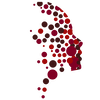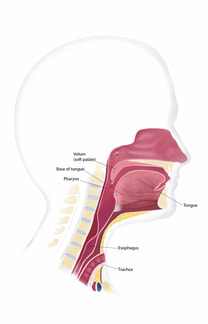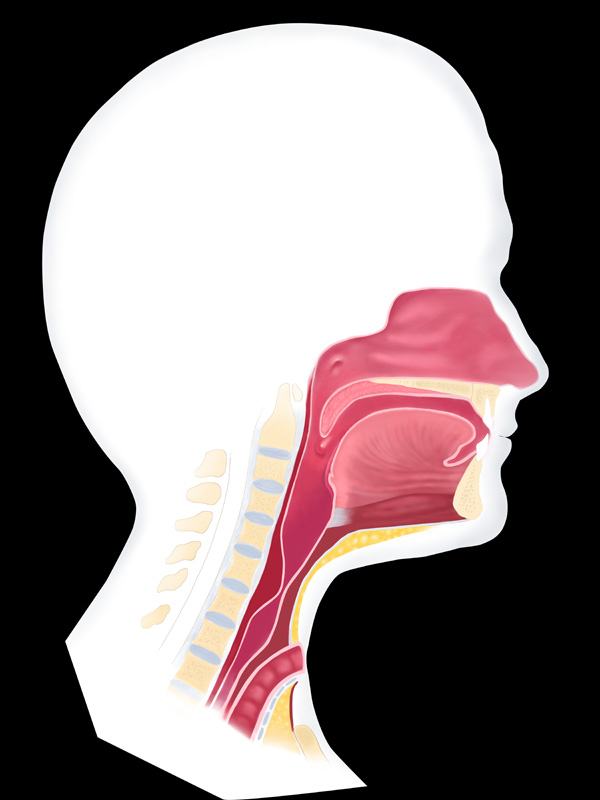Why is it harder to swallow?During the laryngectomy surgery, many of the structures in the throat, useful in swallowing before the surgery, are removed. This does not mean a laryngectomee cannot swallow but the process of swallowing is certainly different. During the laryngectomy surgery, in addition to the vocal cords and “voice box” being removed, the epiglottis and hyoid bone are also removed. The muscles are also reconstructed in a way that changes what happens when they contract. |
After learning how the movement of the larynx and hyoid assist in the pharyngeal phase of swallowing, it becomes easier to understand why swallowing feels so different after the laryngectomy surgery. Also keep in mind that the movement of these structures also helps to open the cricopharyngeus to allow food into the esophagus. As these structures are removed, the mechanical help to open the cricopharyngeus is also lost.
All of this contributes to why the trachea or “windpipe” is diverted, sewn to the neck, creating the stoma a laryngectomee breathes through. Without all the structures to drive the swallow and protect the trachea from food entering, it would become impossible to swallow anything, including saliva, without it entering your lungs, creating a very dangerous situation.
This is also, however, why a laryngectomee can no longer choke during meals.
This is very important to remember. A laryngectomee will not choke or strangle, even if it feels as if the food is “stuck” in the throat. Anxiety over a fear of choking may create more tension in the throat and make it even more difficult for the food material to pass.
Many patients and family members are often questioning how a laryngectomee can swallow once all the “parts” have been removed. Its important to understand that swallowing is very different following a laryngectomy, but it can also be very effective.
Practice and proper instruction can often speed the process of returning to a more normal diet and way of eating. Essentially, the oral phase will be unchanged in a standard laryngectomee patient. It is the pharyngeal phase of swallowing that is most disrupted, as well as the cricopharyngeal opening.
In the beginning of the pharyngeal phase in a laryngectomee, the tongue base serves to push the food downward toward the esophagus. Many reconstruction techniques may limit the tongue base movement to some degree. If the tongue base is not able to contact the posterior pharyngeal wall, the downward movement of the food material becomes less effective. In these cases, gravity will help quite a bit in getting the food to the base of the throat. For this reason, it is important that a laryngectomee eat and drink in an upright posture.
During the pharyngeal phase, the pharyngeal constrictors, squeeze from the top down in a purse string, wavelike manner. This serves as the driving force for how a laryngectomee moves food from the throat into the esophagus. BUT, there is no longer a pressurization of the swallow as the lungs are now open to the outside air or “atmospheric pressure.” The negative pressure that usually exists to help, like a vacuum, to pull air into the esophagus, is lost. This means the throat muscles must do the work of driving the food past the cricopharyngeus.
Radiation, as well as flap reconstruction, can both negatively impact the strength and effectiveness of the pharyngeal constriction. In many cases, therapy can help improve the overall strength and effectiveness of the swallow, although this will first need to be evaluated by the speech pathologist.
The cricopharyngeus is also impacted as a result of the laryngectomy surgery. The structures used to pull this muscle open, allowing food to pass into the esophagus, have been removed. Many times, a myotomy is performed during the laryngectomy surgery, which severs the nerve that allows the cricopharyngeus to remain shut and thus, eases the passage of food through this region.
What foods can I swallow best?
A formal evaluation will always be the best way to determine what foods you can swallow best but there are some general guidelines that typically apply to most laryngectomees.
Softer foods will usually be easier to manage than more solid textures. Foods that “crunch” or make a noise when you bit into them would not be a “soft” food. If you are able to mash the food with a fork, this is usually an indication it is a “soft” food.
Because of xerostomia, or a lack of saliva that can occur following radiation, there may not be enough saliva to lubricate the throat as there was prior to your cancer treatment. We are all designed to swallow through a well lubricated throat so it is important to find other means of lubrication when you swallow. Using extra sauces and gravies will always be helpful. Sticking to more moist foods and avoiding very dry one will be important to. Another very helpful technique is to alternate foods with liquids during meals. Essentially, take a sip of a drink with or immediately following each bite of food. This will help to lubricate the throat and “wash” through any food residue that may be left.
Finally, it is very important that food is chewed thoroughly. Before a laryngectomy, larger “chunks” of food may have been swallowed safely and effectively. Following surgery, however, the reconstructed pharynx may not be able to pass larger pieces of food as effectively. It is very important that food is chewed thoroughly to ensure it passes through the throat and into the esophagus without difficulty. Larger chunks may serve to “clog” the opening to the esophagus, become lodged and not allow any additional food material to pass until it is properly cleared. Be sure to chew your food until no chunks are present.
It is important to note that these are general guidelines and you may be better helped by different food choices and/or eating methods. If you feel you are having difficulty eating, more than to be considered normal for a laryngectomee, you should bring this to the attention of the speech pathology staff. A formal evaluation will better determine how to address your particular concerns.
Why cant I choke?
|
Many patients experience difficulty swallowing before their laryngectomy surgery and the fear of choking can remain quite high following the laryngectomy. Although this is very natural, there is no longer any possible way for you to choke while you are eating.
As part of the laryngectomy surgery, a disconnection or separation is made between the mouth/throat and the lungs. Food material you take in through the mouth can now only go through the throat and into the esophagus, ultimately passing into the stomach. The trachea, or windpipe, which is blocked when a choking event occurs, has been |
disconnected from the throat and is now diverted outward, attaching to the neck. Although you may experience difficulty swallowing and have a natural fear of choking, there is no longer any way for a laryngectomee to choke while eating.
Is there anything i can do to help my swallow?
In many cases, there are interventions that can help optimize your swallowing ability, but a formal evaluation is required to first determine the nature of the difficulty you are experiencing, then identify appropriate methods to help you. These methods can be as simple as altering the foods you eat or how you eat them, to formal therapy or even surgery. See Common Treatment Methods.
When should I see my doctor about my swallowing difficulty?
If you have any concerns about your ability to swallow, these should always be told to your doctor or speech pathologist. Many times, further evaluation is needed to determine the cause and severity of your swallowing difficulties, which will allow the doctor or speech pathologist to treat your specific issues and help you to swallow as best as possible.
If you notice increasing difficulty swallowing, painful swallowing, tiresome swallowing, -these should always be addressed immediately. If you notice it is becoming more difficult to swallow, that is also something that should be addressed immediately as well. Finally, if you are struggling to be able to eat enough or are losing weight, these are all issues of concern and should be brought to your doctor’s attention. This doesn’t necessarily mean there is a problem or something worrisome is going on, but it is important you are swallowing as best as possible.



